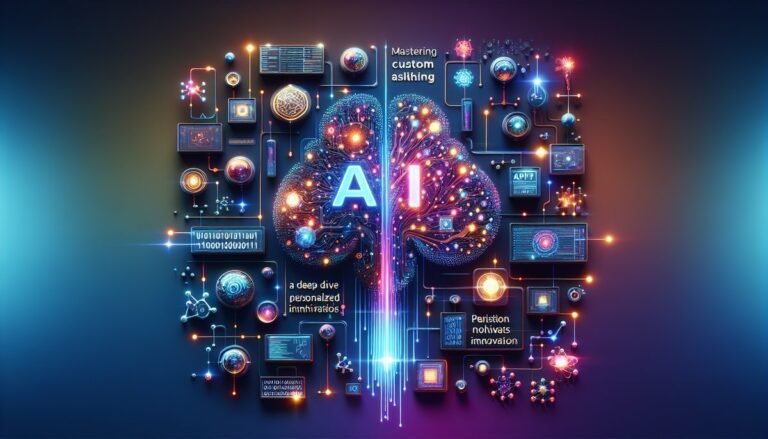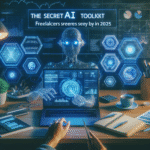In an age where technology is supposed to make us smarter, the notion of AI Making Us Dumb seems paradoxical, yet it’s gaining traction. As Artificial Intelligence becomes increasingly intertwined with our daily lives, from managing our schedules to predicting our shopping preferences, it’s worth pondering: is this digital crutch actually holding us back? The convenience and efficiency AI promises might come at a cost to our cognitive abilities, subtly influencing our decision-making processes and problem-solving skills. This listicle explores ten surprising ways AI could be dulling our sharpness, challenging the very fabric of human intellect. So, before you hand over the reins to your digital assistant or trust an algorithm blindly, delve into these unexpected insights that reveal how AI’s presence in our lives might be more of a double-edged sword than we realize.
1. The Illusion of Knowledge Through AI
One of the most subtle ways AI might be making us dumb is by creating an illusion of knowledge. With AI-powered tools like chatbots and search engines offering instant answers, there’s a tendency to accept information without critical analysis. This passive consumption can lead to a superficial understanding of complex topics. While AI can provide quick facts, it does not replace deep, reflective thinking that is essential for true comprehension.
Take, for example, a student researching for an assignment. Using an AI-driven search engine, they may quickly gather data but miss out on the critical thinking process involved in synthesizing information from multiple sources. This reliance on AI can dull our ability to engage deeply with content. In this way, AI making us dumb is not about the technology itself, but how we choose to use it.
2. Dependency on AI for Problem-Solving
AI tools are increasingly being utilized for problem-solving across various domains, from technical fields to everyday tasks. While this enhances efficiency, it also poses the risk of diminishing our problem-solving skills. When we lean too heavily on AI for solutions, we may lose the ability to think creatively and critically.
Consider the example of navigation apps. While they guide us effectively from point A to point B, they also reduce our ability to read maps or understand geographical nuances. This reliance is a small-scale illustration of a larger issue where AI making us dumb could result in a widespread decline in our innate problem-solving abilities.
3. Reduction in Memory Retention
AI’s role in storing and retrieving information means that we often delegate memory tasks to our devices. This shift can lead to a decline in our ability to remember facts, figures, and even personal experiences. By outsourcing memory, we risk weakening the brain’s natural capacity to store and recall information.
This phenomenon is akin to how calculators have impacted basic arithmetic skills. While calculators are essential tools, over-reliance can make us forget foundational skills. This aspect of AI making us dumb highlights the importance of balancing technological aid with mental exercise.
4. Diminishing Social Interactions
AI applications like virtual assistants and social media bots are changing the way we communicate. While they offer convenience and connectivity, they can also reduce the quality of human interactions. Over time, reliance on AI for social engagement may lead to a decline in interpersonal skills and emotional intelligence.
For instance, individuals increasingly rely on AI to remind them of birthdays or send automated messages, which can feel impersonal and lack genuine emotional connection. In this way, AI making us dumb can manifest as a reduction in our ability to nurture and maintain meaningful relationships.
5. The Decline in Analytical Skills
AI’s ability to process and analyze data at high speeds is unmatched. However, when we rely on AI to interpret data for us, we may become less adept at analyzing information critically. This reliance can lead to a passive acceptance of AI-generated insights without questioning their validity.
Imagine a scenario where financial analysts depend solely on AI algorithms for market predictions. While these tools are powerful, they should complement—not replace—human intuition and expertise. The concern here is that AI making us dumb could result in a generation of professionals who lack the analytical acumen to challenge and verify AI findings.
6. Creativity Stifled by AI
AI is capable of creating art, music, and literature, but there’s a growing concern that it might stifle human creativity. By offering readymade solutions and ideas, AI can discourage the creative process that comes from grappling with a blank canvas or a new concept.
Consider AI-generated music compositions. While impressive, they may lead musicians to rely on algorithms rather than their own creativity. The notion of AI making us dumb resonates here as it pertains to fostering an environment where human creativity is overshadowed by AI capabilities.
7. Emotional Intelligence at Risk
AI’s role in emotional recognition and response, such as in customer service bots, raises concerns about our emotional intelligence. The ability to understand and manage emotions is a distinctly human trait that could be eroded by AI’s influence.
As AI becomes more prevalent in roles that require empathy, there’s a risk that we may become detached from our own emotional responses. This aspect of AI making us dumb is particularly worrying in professions that rely heavily on human interaction, such as healthcare and education.
8. Overconfidence in AI Outputs
AI’s efficiency can lead to an overconfidence in its outputs, which is dangerous when those outputs are flawed or biased. This blind trust can result in poor decision-making and a lack of accountability, as individuals may defer responsibility to AI.
For example, reliance on AI for hiring processes may inadvertently perpetuate biases if the algorithms are not scrutinized. Here, AI making us dumb manifests as a diminished capacity to critically evaluate and question AI-driven conclusions.
9. The Erosion of Traditional Skills
As AI takes over tasks such as writing, calculating, and even cooking, traditional skills may fade into obscurity. The convenience AI offers can lead to a neglect of skills that were once essential for daily life and survival.
Take handwriting, for instance. With AI-enabled typing and voice-to-text technologies, the art of handwriting is becoming less common. AI making us dumb in this context highlights a broader cultural shift away from skills that require practice and patience.
10. The Shift in Learning Processes
AI’s integration into education is transforming how we learn. While AI tutors and personalized learning paths offer benefits, they also change the traditional learning process, which includes trial and error and the development of grit and perseverance.
This shift can lead to a superficial understanding of subjects, as students might prioritize AI-suggested shortcuts over in-depth learning. This aspect of AI making us dumb underscores the importance of maintaining a balance between AI-assisted learning and traditional educational methodologies that foster a deeper understanding and resilience.
Charting the Course: AI’s Role in Human Evolution
As we navigate the complexities of Artificial Intelligence, it’s crucial to recognize its potential not as a crutch but as a catalyst for human advancement. The insights from our listicle highlight that while AI can automate mundane tasks, it also challenges us to develop more sophisticated skills. Embracing this duality, we can leverage AI to enhance our cognitive abilities rather than diminish them. Looking forward, the key lies in fostering a symbiotic relationship where AI complements human creativity and problem-solving. By exploring unconventional tech opportunities, we can harness AI’s transformative power to propel us into a future where human intelligence and artificial systems work harmoniously, driving innovation and progress.






